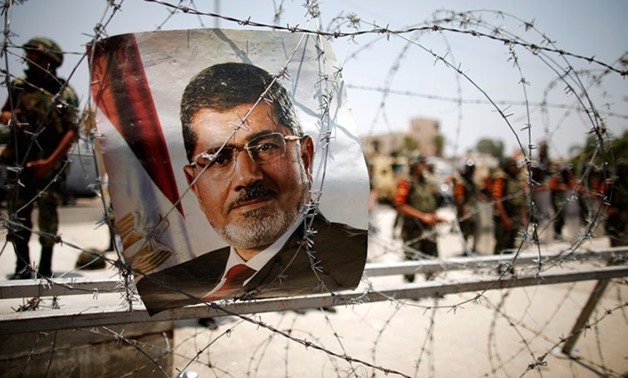
A portrait of deposed Egyptian President Mohamed Morsi is seen on barbed wire outside the Republican Guard headquarters in Cairo on July 6, 2013. (Reuters)
CAIRO – 2 May 2019: “The mere thought of the presence of the Muslim Brotherhood in a major regional state such as Egypt provokes the most ominous specters,” Abdulrahman Al-Rashed, a veteran columnist and former general manager of Al Arabiya news channel, has said in an article. “Today’s reality shows the Brotherhood’s regression in the region, most recently in Libya and Sudan.”
A large scale popular uprising in Egypt in 2012-13 against then-President Mohamed Morsi ousted him and the Muslim Brotherhood, which is now designated a terrorist organization.
“We cannot say it is the end for Islamist movements aspiring to govern while their main supporter in the region, the Iranian regime, is still present, along with dominant extremist divisions such as Hamas in Gaza and Hezbollah in Lebanon.
“But these movements are experiencing increasing restrictions — both ideologically and institutionally — as the organizations that once financed their radical ideology and militaries have subsided,” Al-Rashed added.
He referred to a recent book titled “Qatar Papers,” written by French investigative reporters Georges Malbrunot and Christian Chesnot, which has received significant attention in France, and seems to have had many implications for the financing of schools and organizations in Europe that pursue radical Islamist ideology, after they turned out to be a refuge for extremist organizations.
This ideology has significantly subsided in Saudi Arabia due to legislative reforms and modernization projects led by the state. Moreover, one cannot overstate the importance of the effects of US President Donald Trump’s plan to dry up the financial resources of the Iranian regime, which directly finances tens of groups and centers in Iraq, Lebanon, Africa, South East Asia and Central Asia.
Simultaneous attacks might be the key to eliminating Islamist movements that aspire to rule. Eliminating them might actually end the scourge of political, social and religious extremism that has spread since the 1980s. Developments in Sudan and Libya are part of the fight against the dangerous progress of extremist movements, which tried and failed to seize power in Egypt, Iraq and Libya.
He also added that ousting the Muslim Brotherhood is an important development in the region’s conflict against such ideological organizations. Movements like the Muslim Brotherhood on the one hand, and ISIS and Al-Qaeda on the other, are similar in their objectives and aspirations.
Those who view the overthrow of Islamist systems and organizations as something bad, fearing that the regimes will turn into military governments or civilian facades for them, might be right. But they should not feel sorry for the overthrow of the Brotherhood’s wings (the last one being Omar Al-Bashir’s regime in Sudan) just because they assume the region was heading toward a civil society and institutional development, because this is incorrect. One might assume this, but all evidence indicates otherwise.
In Iraq, the Americans sought to build a developed civil society by establishing democratic institutions, a constitution, an elected Parliament and a free media. But they soon reconsidered their decision by allowing religious organizations to participate, work and rule. As such, Iraq today is not what was hoped for.
“Others might not have been qualified to rule, but having US-approved religious parties in power has destroyed the prospect of a civil republic that can accept religious men and ideas without the need to form a religious political force.
“We can argue whether the Americans were the ones responsible for these religious organizations, or whether they recognized their power and attempted to include them in Iraq’s political scene so as not to spoil the political process,” Al-Rashed said.
In Iraq, the influence of religious political parties and figures has shrunk. The Arab world is still trying to get over the period that followed the 1979 revolution in Iran, and the recent downfall of Islamist regimes, which are achievements for popular resistance. However, the alternatives do not necessarily have to be similar political projects.


Comments
Leave a Comment